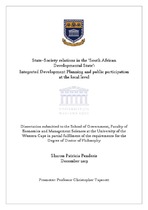| dc.description.abstract | In various formulations, the idea of a developmental state has appeared in official discourse in South Africa since the advent of democratic government in 1994, albeit that its adoption as state policy has been slow, uneven and inconsistent with the original East Asian model. What has been a feature of developmental state thinking in South Africa is the fact that the concept has been so poorly articulated in policy that it has come to mean different things to different state actors and to the public. This has been aggravated by the fact that the idea of a strongly interventionist developmental state has run counter to the idea of a diminished state enunciated in various neo-liberal policies. Moreover, unlike the authoritarian and top-down East Asian model, the government envisages a South African developmental state which is infused with democratic content where citizens assist in the formulation of policy from below. In its emphasis on a bottom-up approach to policy formulation the South African model differs markedly from the conventional idea of a developmental state which is heavily reliant on a strong central bureaucracy to drive economic growth. In the South African model local government has been assigned a pivotal role in addressing persistent economic exclusion and uneven development. A central tenet of this approach is the need for local authorities to institutionalise participatory processes at grassroots level and devise effective structures and processes to facilitate citizen participation in local affairs. In the light of the above, this thesis sets out to examine the manner in which a system of developmental local government is being implemented in the City of Cape Town. Taking as a case study the township of Delft, the study looks at the systems and processes (and particularly the process of integrated development planning) set in place to advance citizen participation. It examines the extent to which the model is perceived to be achieving its goals from the perspective of political office bearers, officials from different spheres of government and residents. The research found that notwithstanding an enabling legislative and policy framework, there is little comprehension of, or interest, in the idea of developmental local government and municipal officials largely pay lip service to participatory processes which are carried out in a top-down fashion and which neither empower local residents nor enhance their welfare. It also concluded that developmental government, in its present form, is contributing little to the establishment of a national developmental state. | en_US |

